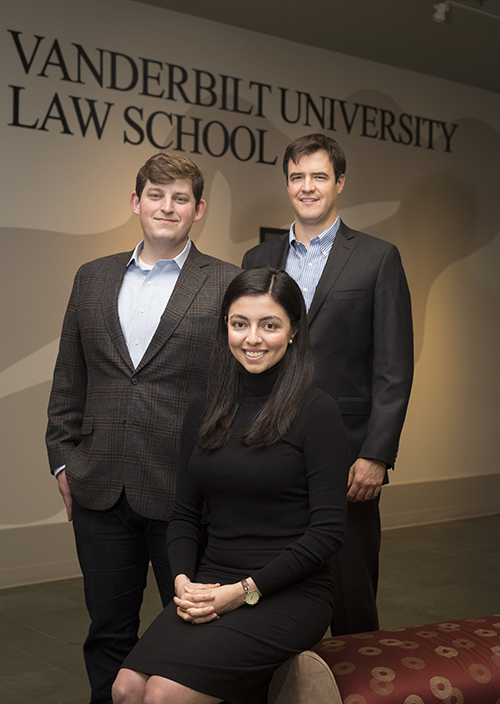
Four Vanderbilt law students will compete on Vanderbilt University teams in a global competition for social entrepreneurs sponsored by the Hult Prize Foundation.
Nat Robinson ’18 (MBA ’07) and Yalda Godusi ’18 will travel to Dubai with their team, which also includes Owen Graduate School of Management students Kayla Armgardt ’18 and Tori Samples ’18, for the competition.
John Davidson ’18 and Taber Hunt ’17 (not pictured) are bound for London with a team that includes Owen MBA student Jessica Osaki ’17.
The annual Hult Prize Competition challenges multidisciplinary student teams to develop comprehensive business plans for innovative enterprises that address global challenges affecting billions of people. The 2017 competition challenged teams to develop business plans to aid refugees fleeing domestic strife or displaced by natural disasters or the effects of climate change or mitigate conditions that create refugees. The winning team receives $1 million in seed funding for their enterprise.
The project Davidson and Hunt are supporting grew out of a business plan developed for Owen’s Innovation Realization course taught by Professor Marie Thursby, which brings together MBA, law and engineering students to focus on technological innovations and develop an implementation plan that identifies the legal issues that must be addressed to implement the plan. The Dubai team of Robinson, Godusi, Armgardt and Samples developed their proposal in response to a Vanderbilt Hult Prize pitch competition organized by the Turner Family Center for Social Ventures.
The London team members initially worked with an engineering student to develop a marketing plan for technology that converts environmentally harmful carbon dioxide gas into a stable material that can be sold on the second market. “About 2 million people are currently displaced because of climate change, and by 2050, 50 million people will be threatened by rising sea levels and changing weather patterns,” Davidson said. “Our goal is to reduce the number of future refugees by reducing the amount of CO2 in the atmosphere.”
The Dubai team proposed a social enterprise, HydroHaven, which would provide safe passage for refugees from Syria and African nations who would otherwise be forced to flee across the Mediterranean on unseaworthy vessels. HydroHaven would transport refugees safely to Greece or Italy in cruise ships leased during the off season, when the vessels are otherwise idle. Services facilitating applications for refugee status, language training and health services would be provided on board. “This company could profitably provide safe passage for refugees across the deadly waters of the Mediterranean over the next five years,” Godusi said. “Estimates project that over 10 million refugees will be displaced worldwide by 2022.”
Davidson researched patent law related to the carbon conversion technology his team proposes to develop. To support their team’s proposal, Robinson researched corporate law, while Godusi focused on international immigration law. “Mediterranean cruise ships are underutilized much of the year,” Robinson said. “We wanted to find a way to connect these idle ships with migrants who are trying to cross and provide services at sea so they’re better prepared to integrate when they land.”
The VU teams will travel to Dubai and London in March to present their projects in the international competition.